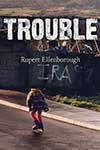|
TROUBLE
by Rupert Ellenborough

|
The Troubles in Northern Ireland (NI) exercise a powerful grip on the minds of soldiers who served there. We should not forget that more soldiers were killed in Northern Ireland than in the Falklands Campaign, the Balkans, Iraq 1 and 2, and Afghanistan put together. And a significant number of those deaths occurred in the 1970s in West Belfast, South Armagh, and Londonderry.
This first novel by a former Coldstreamer, Rupert Ellenborough, better known to his contemporaries as Rupert Law before he succeeded to the family title, starts in West Belfast in 1976. There is a strong autobiographical vein in the book. This is a strength as Rupert’s perfect sense of place and atmosphere conveys the grimness and the moral questions posed by soldiering in what was close to a civil war.
Only a sociopath would look at the NI conflict in monochrome, good against evil, IRA terrorist against the British Army, the Protestant majority versus the Catholic minority. The ties of kith and kin, a shared history and culture made the Troubles so much more complex. The term ‘ Troubles’ was an understated form of language to soften what was a bloody and visceral conflict, not just in NI but in mainland Britain as well. It is also an apt phrase as even now, 27 years after the Belfast ( Good Friday) peace agreement, both sides of the conflict remain deeply troubled by what took place. Closure still seems far away. It is to Rupert’s great credit that he has captured the moral ambiguity of the NI conflict and allow the reader to enjoy not just a good story but to think more deeply about the dilemmas faced by soldiers doing their best in the ‘grey zone,’ or low - intensity conflict.
The story follows Second Lieutenant Colin Smith (the only misfire in the book, a Guards officer called Colin Smith in 1976?), whose split-second decision to shoot a suspected gunman unravels into a series of events that snarl him up in political and personal turmoil. Rupert's narrative also brings cleverly into play Brendan Flynn, a member of the IRA whose life collides with Colin's in a struggle for survival.
It is a compelling read. The art of writing a gripping novel is to evoke an emotional response from the reader as well as using conflict and tension to drive the story forward. It should also have a strong internal logic, to make sense in its own world with no inconsistencies. Rupert is faultless on this as he can draw from the well of his own personal experience of serving with the Coldstream in NI at the height of the Troubles: ‘Strabane was a dangerous place for the army and the RUC, and it had witnessed a litany of IRA killings in the past. As a result, the security forces maintained a force of company strength based at the RUC station in the centre of the town, with an extra platoon based in Sion Mills to the west of the Mourne river’.
A tricky issue in writing a novel, often overlooked, is writing dialogue that would be spoken naturally with all its informality and incomplete sentences and phrases, rather than a form of words you might use in writing. Rupert does this well.
The characterisation of the various players amusing, and one imagines there may be a few Coldstream officers who Rupert has portrayed, albeit with pseudonyms, starting to 'bob about' thinking, ‘is that me, is that what he really thought?'. 'Kershaw, his company commander was an ambitious career officer with a perfect regimental pedigree....
“You were late for the barrack guard mount. You can take an extra picquet duty!” said Captain Ian Munro, the assistant Adjutant..... Ian Munro felt smug; he loved being nasty’.
The author is to be congratulated on an excellent first novel. It's a wonderful read for those of us who have served there; and equally engaging for anyone who wants to get a true sense of what the Troubles were like. Rupert finishes the book open ended. Colin Smith is now a captain and the British Army from the Troubles to Afghanistan is the richest of seams to mine.....another book please Rupert. Surely many more great stories to be told unless it really was just an autobiography about your time in NI?
Paul de Zulueta
Vanguard Press |
|

